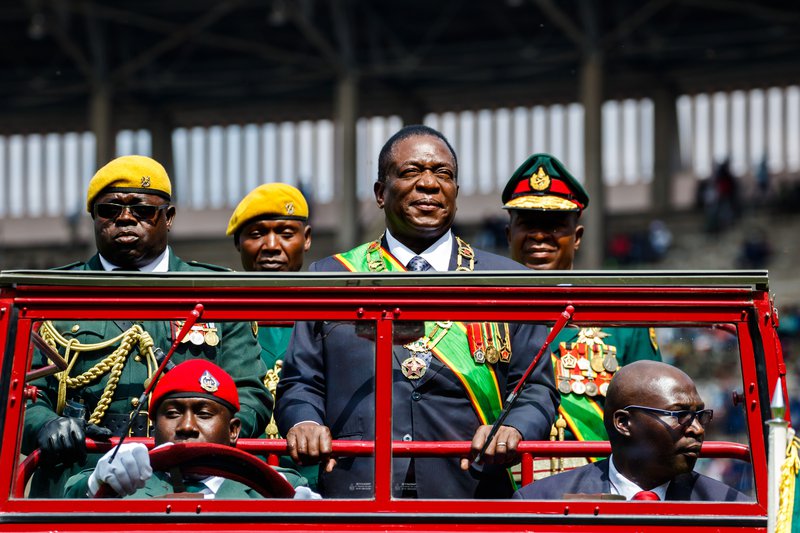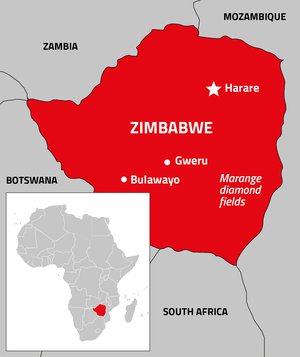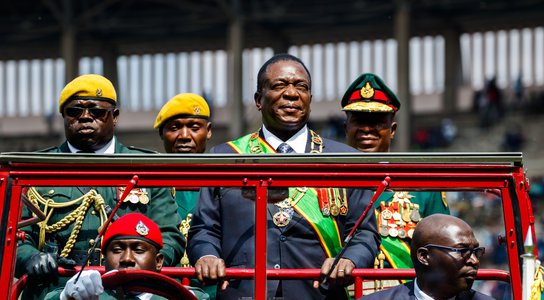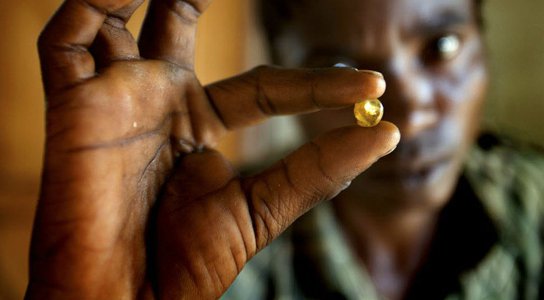President Mnangagwa has pledged to deliver a new era of stabilisation and growth for Zimbabwe.
Carefully managed, the country’s diamond sector may have much to offer in stimulating economic recovery and contributing to development and democracy in Zimbabwe.
Our new briefing shows that it is only through a concerted effort to overhaul the industry based on principles of transparency and accountability, that the mistakes of the past will not be repeated and the Zimbabwean people will see real benefit from their precious natural resource.
BREAKING WITH THE PAST?
In his first year as Zimbabwe’s President, Emmerson Mnangagwa has pledged to stamp out corruption, prioritise economic recovery and attract foreign investment, following nearly two decades of instability and international isolation.
At this critical juncture, the management of Zimbabwe’s valuable diamond industry will indicate whether the new government is serious about reform and willing to match rhetoric with action, as we reveal in our new briefing.

"As we focus on recovering our economy, we must shed misbehaviours and acts of ill-discipline which have characterised the past. Acts of corruption must stop." President Mnangagwa, November 2017
Photo: © Jekesai Njikizana/AFP/Getty Images
The diamond sector is one
of the country’s key industries, but corruption, structural weaknesses and the
ruthless misappropriation of diamond wealth under former President Robert
Mugabe’s tenure not only deprived the Zimbabwean people of a precious source of
funds for development but may have fuelled human rights abuses.
With recent indications of new investment in Marange’s diamond fields, the Mnangagwa-led government’s ability to harness the potential of the sector for the benefit of the population will test his resolve to live up to promises of delivering economic reform and breaking with past ‘misbehaviours’.
THE LOOTING OF MARANGE’S DIAMONDS
The discovery of huge deposits of diamonds in Marange, eastern Zimbabwe, in the mid-2000s came at a time when Zimbabwe was facing crises on multiple fronts. However, rather than injecting much-needed life into an economy in severe decline, Zimbabwe’s diamonds were ruthlessly exploited by the elite under the Mugabe-led government and came to be far better known for their association with human rights abuses, corruption and looting.
The Zimbabwean people saw very little benefit from the Marange find with billions of dollars’ worth of the precious stones still unaccounted for.

The Zimbabwean military have played a central role in the Marange diamond industry ©JEKESAI NJIKIZANA/AFP/Getty Images
THE ROLE OF THE SECURITY FORCES
The role of the security sector in the Marange diamond industry has been of significant concern since the outset. In 2008, the army launched a brutal clampdown on informal miners in Marange in which an estimated 200 people were killed. This triggered the biggest crisis in the history of the international diamond certification scheme, the Kimberley Process.
Global Witness investigations showed how extreme secrecy across the diamond sector facilitated wide-ranging harms to flourish and revealed extensive involvement of the security forces with both the army and the Central Intelligence Organisation holding ownership stakes in diamond mining companies.
The security forces have played a key role in silencing dissenting voices in Zimbabwe, including through the orchestration and perpetration of campaigns of violence, particularly during political processes, presenting the risk that diamond mining money could have funded abuses.
URGENT REFORMS NEEDED
The decade-long looting of Zimbabwe’s diamonds and the associated violence and abuses were aided by a lack of transparency and oversight.
To avoid repeating the mistakes of the past and allow the diamond sector to finally realise its potential for the people of Zimbabwe, it is crucial that the government and companies in the diamond industry implement a raft of transparency reforms.

© Global Witness
Meaningful changes to how the country’s diamond sector is managed would
be a concrete sign of the political will to affect a real break with the past and help reassure the international community and responsible investors
of the government’s commitment to deliver a clean and accountable business
environment.
This could help support economic growth and fund the Zimbabwean budget. Currently over half of the population is living beneath the poverty line, the government is in arrears on most of its USD 11 billion of external debt and depends on USD 810 million in annual international aid.
Moreover, a reformed diamond sector may also point the way towards reforms needed across Zimbabwe’s economy to combat corruption and ensure all share in its economic resources.
OUR RECOMMENDATIONS
To help to achieve a transparent, accountable and well-governed diamond sector, we are urging the Zimbabwean government to take much-needed steps including:
- Making all beneficial owners
of diamond companies, and any private investors, public;
- Publishing detailed
information about all diamond mining related revenue flows, disaggregated by
company, year, and type of revenue stream;
- Publication of any joint
venture contracts signed with private investors;
- Requiring risk based supply
chain due diligence by companies trading in Marange diamonds;
- Preventing the risk of the security sector receiving off-budget funding through control or ownership positions in diamond companies that is free from parliamentary oversight.
Contacts
You might also like
-
Press release Marange diamond industry is the litmus test of Zimbabwe’s reform
The new government’s handling of the Marange diamond industry will be a clear indication of whether its commitments to economic reform and anti-corruption go beyond lip service.
-
Report An Inside Job
Global Witness has uncovered new evidence linking Zimbabwe’s state and partisan security forces to a decade of disappearing diamond wealth.
-
Campaign Zimbabwe
Zimbabwe's diamond trade should be funding development. Instead, there is a risk that diamonds are funding repression.